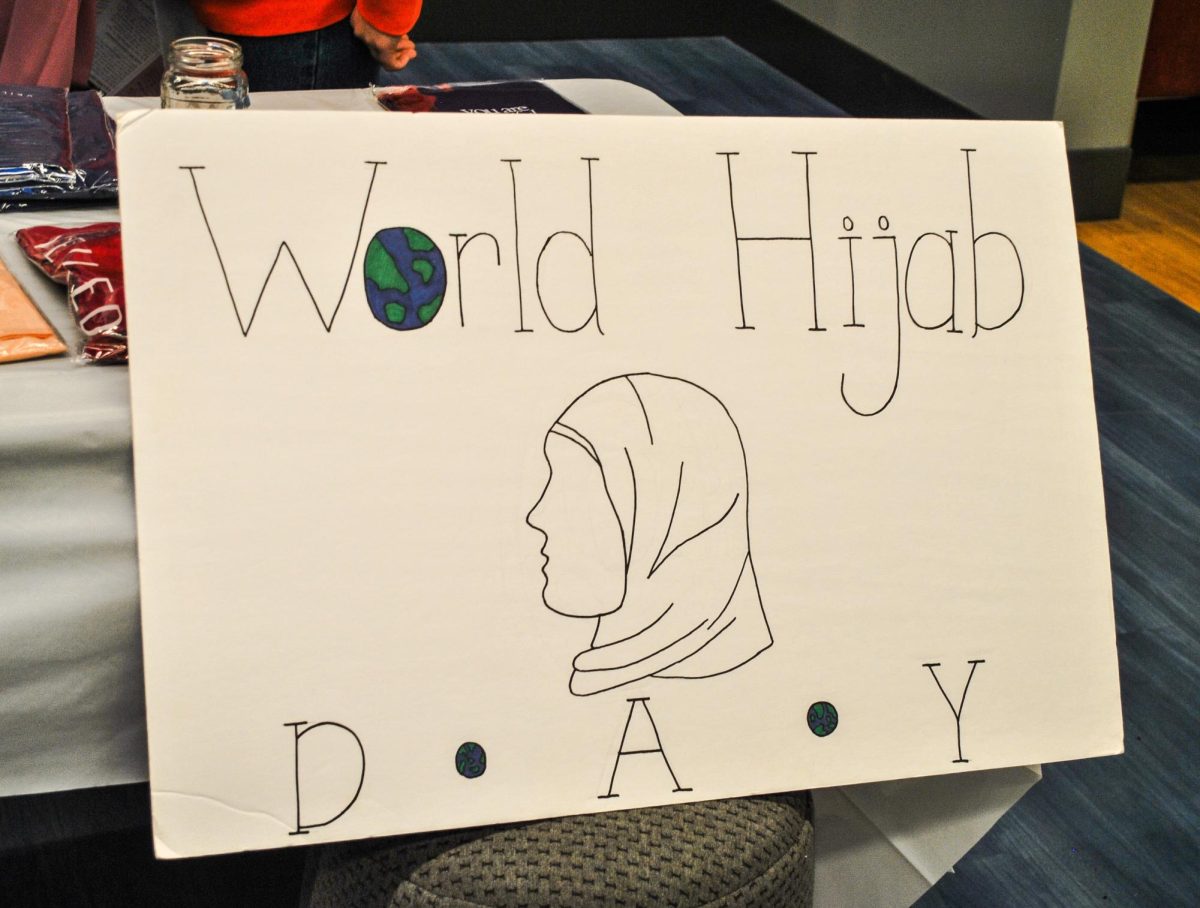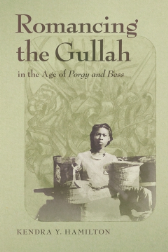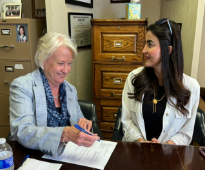On Thursday, February 1st, PC students encountered an interesting booth placed at Springs’ Great Room. It was a hijab booth set up to bring awareness to World Hijab Day, an annual recognition of the millions of Muslim women who chose to wear the hijab and a life of modesty.
Students were able to ask questions, achieve a better understanding of the meaning of the hijab, and defy stereotypes in an open and safe space to discuss. There were brochures available for everyone, and women were encouraged to wear and experience the hijab firsthand.
Yasmeen Rasasi was the student who promoted and organized this activity on campus. When asked about her motivations for the initiative, she shared:
“Hijab Day is an international thing so it’s celebrated all across the world, but the reason why I wanted to bring it to PC specifically is because I am the first hijabi here, and being the first hijabi gives me the opportunity to be able to give people the first-hand chance of asking me questions from someone who actually wears the hijab and has been wearing it for many years. I also want to create a safe group and environment at PC that allows people to explore different religions, because the more that we continue to learn about each other, the more empathy we build and the more that we connect with each other”
If you happen to be in downtown Greenville on the 17th, you’re in luck! There is going to be a hijab booth set up by Young Muslims Greenville, a national young Muslim girl group that meets and discusses their lives and Islam in a safe space dedicated to empowering women. The group has also been involved with hosting local charities and fundraising for well-being in underdeveloped countries.
For more information, you can follow @youngmuslimsgreenville on Instagram or email Yasmeen at [email protected]
Frequently asked questions about Hijab
What is the hijab?
The word “hijab” literally means “barrier” or “covering” in Arabic. In Islam, both genders have different “hijabs,” and the term encompasses a holistic understanding of inner and outer modesty. In modern terms, the hijab is known as the religious head covering worn by Muslim women.
Why do Muslim women wear the hijab?
The hijab represents a woman’s submission to her Creator and her connection with her faith. When a Muslim woman wears a hijab, she is obeying and submitting to God (Allah). “Islam” literally means submission to Allah, regardless of one’s personal desires.
Is hijab mandatory/ required?
Yes. As stated in Chapter 24 Verses 30-31 of the Quran, God says, “Tell the believing men to reduce [some] of their vision and guard their private parts (…).” “And tell the believing women to reduce [some] of their vision, guard their private parts and not expose their adornment except that which [necessarily] appears thereof and to wrap [a portion of] their headcovers over their chests (…).”
Are Muslim women forced to wear the hijab?
No. In fact, Islam forbids any aspect of the religion to be forced upon someone. In Chapter 2 Verse 256 of the Quran, God says, “There shall be no compulsion in [acceptance of] the religion (…).” God created mankind with free will alongside the guidance of the Quran and His prophets. Whether someone chooses to follow His commandments is a personal decision, and it is not the responsibility of others to impose anything on them.
Do all Muslim women wear the hijab?
Although it is a requirement for Muslim women to wear the hijab, not all Muslim women do. Whether a Muslim woman decides to adhere to the Islamic rule of wearing the hijab is her choice. A Muslim woman who wears the hijab is not better than a Muslim woman who does not. In Islam, a person is only better than another in their piety toward God, and only God can determine a person’s piety.
Is the hijab a symbol of oppression?
No, rather the exact opposite. For many Muslim women, hijab means liberation. Liberation from man-made expectations for women that judge them based solely on their bodies and appearances. While wearing the hijab, a Muslim woman no longer must worry about her external beauty to gain recognition or acceptance from others. Rather, the hijab forces people to appreciate a woman’s intellect and character above all else.
When do Muslim women have to start wearing the hijab?
When a Muslim woman reaches puberty, she is required to wear the hijab. However, some Muslim women do not wear the hijab when they reach puberty and opt to wear it later in their lives.
Who can see a Muslim woman’s hair?
All females and any male mahram (someone she is never permitted to marry because of their close blood relationship, because of breastfeeding, or because they are related by marriage) can see her hair. Those who are a woman’s mahram are highlighted in Chapter 24 Verse 31 which lists them as her husband, her father, her husband’s father, her sons, her husband’s sons, her brothers, her brothers’ sons, her sister’s sons, and children who are not yet aware of the private aspects of women. Both paternal and maternal uncles, grandfathers, and male grandchildren are all also a woman’s mahram, although not included in this verse.







